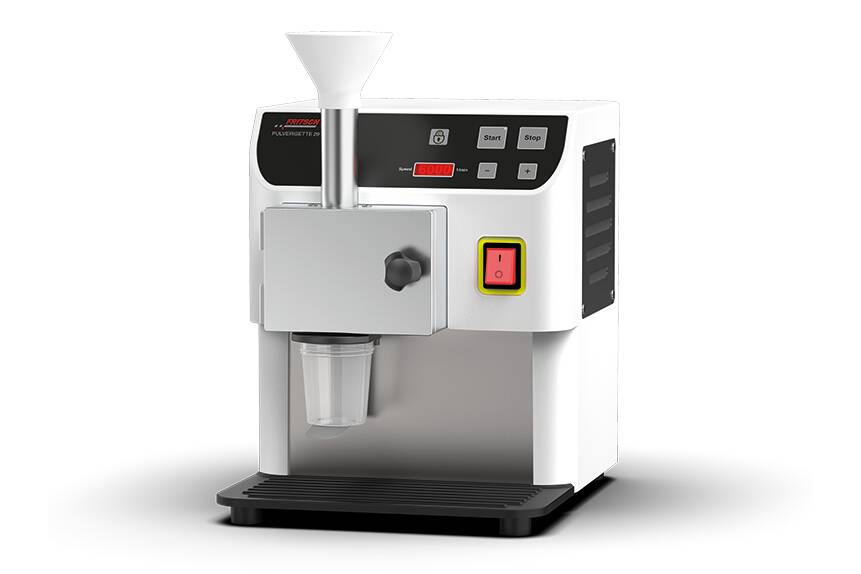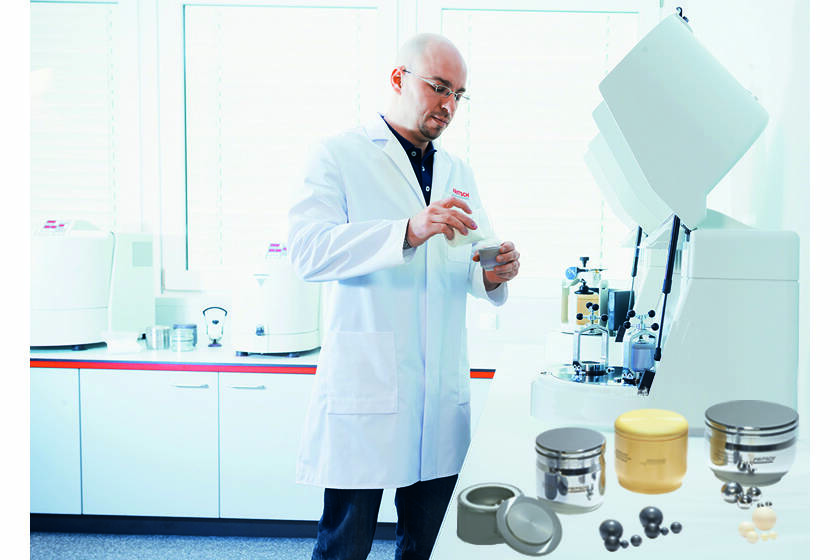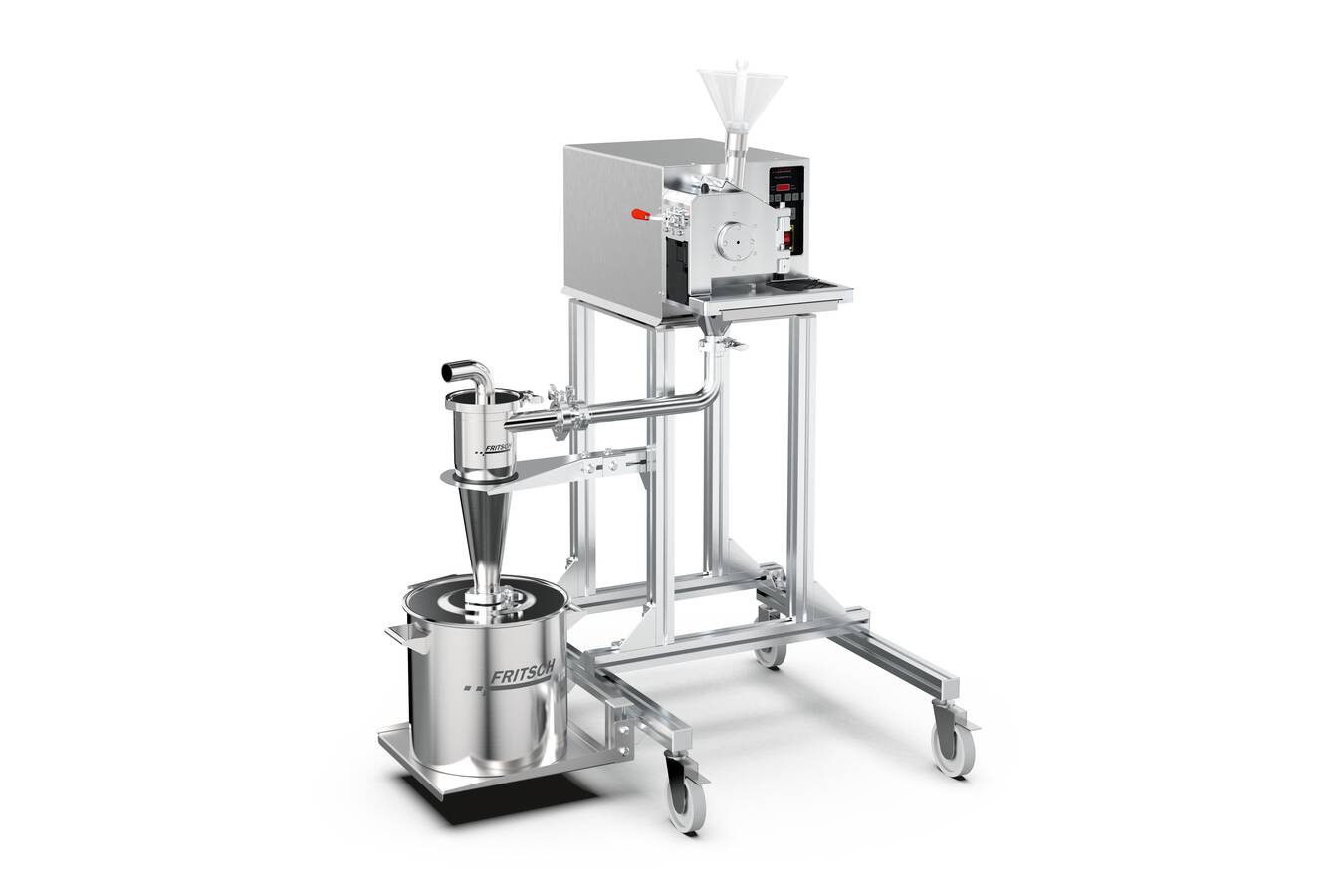The most common method to extract the active ingredients from the cannabis plant is supercritical CO2 extraction. At a temperature above 31˚C and with high pressure, the CO2 gets into the supercritical state, where it acts as a solvent. Passed through a chamber containing the plant material, it still has the density of a liquid but can fill the entire chamber like a gas. The advantage: The CO2 extracts the cannabinoids and terpenes from the plant without causing denaturation or damage to the product.
This produces a safe, high-quality, pure oil that can be processed for a variety of therapeutic uses. The big challenge: the highest possible yield of the ingredients in the shortest possible time. This requires optimum, homogeneous grinding of the cannabis plant. No problem with FRITSCH technology.
Homogenization and characterization of CBD isolates
Solid isolates of CBD can be produced as a nonhomogeneous “cake” of materials or as a mixture of loosely associated granules comprising a wide particle size distribution. Creating material suitable for consumption or subsequent formulation in other products typically requires particle size reduction and/or homogenization. Confirmation of particle size distribution of a given sample may be achieved via traditional sieving methods or by using a particle size analyser.
Primary considerations when selecting a milling system for CBD homogenization include:
- batch size – throughput requirement per kg/batch or day
- minimising losses – physical and/or chemical
- the desired final particle size range
- easy cleaning to prevent batch cross-contamination
- the (residual) moisture content
CBD homogenization in small- and medium-scale
Small-scale homogenization of CBD isolate may be achieved by low energy ball milling or by automated mortar grinding with pestle. Larger batches of CBD material can be quickly and continuously homogenized in the FRITSCH P-14 Variable Speed Rotor Mill with Cyclone separator down to the lower micron range to the fineness of talcum powder. The combination of extremely fast homogenization with active removal of material from the rotor area in a fraction of seconds means there is no time for a temperature increase due to friction, which could cause chemical degradation. Another advantage: Product contact surfaces are made of stainless steel or food-grade plastic vacuum hoses for the Cyclone separator and can all be cleaned between batches to reduce the likelihood of cross-contamination. A variable speed motor and a wide range of sieve rings provides precise control of particle size output.
CBD homogenization in large-scale
We recommend the FRITSCH Universal Cutting Mill P-19 for homogenising CBD isolate to produce a uniform powder on a production-level scale. Already considered worldwide as the leading precision milling solution for preparing cannabis biomass for extractions or pre-rolls, it can be configured just as effectively as a homogenizer.
We recommend the following system settings for this purpose:
- Speed between 2000 – 3000 rpm
- Rotor with notched edges and fixed knives
- Gap setting 1 – 2 mm between the cutting rotor and fixed knives
- Sieve cassette: 1, 2 or 4 mm – depending on the nature of sample material and the desired final fineness
- High-performance stainless-steel Cyclone separator
- Powerful vacuum cleaner
Quality control through analysis of CBD particle size
Characterizing the particle size distribution of a CBD sample confirms that the milling system used has achieved particles within an acceptable range, has met important criteria for release into the manufacturing process or for product sale, or the efficacy of a compound is based on its particle size. Laser particle size analysers with Reverse-Fourier design, which were developed and patented by FRITSCH more than 35 years ago, offer enormous advantages and greater flexibility compared to conventional sieving. Above all, the FRITSCH Laser Particle Sizer A-22 NeXT has proven its capability in characterizing CBD isolates in wet or dry dispersion.


